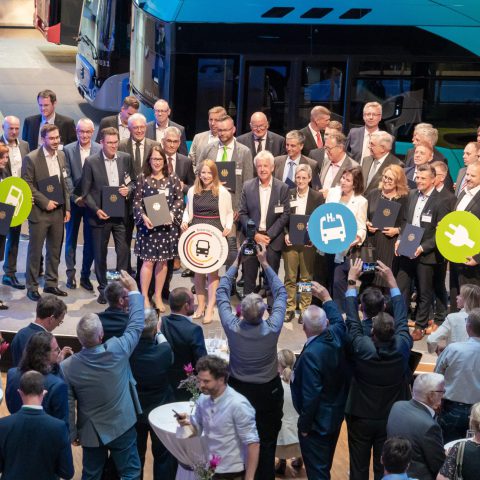90 exhibitors will gather at Mobility Move (former ElekBu in Berlin) with record attendance of 1,400
1,400 participants, 90 exhibitors (vs the 78 companies exhibiting in 2022), 20 vehicles: these are the figures of Mobility Move, the first edition under new brand of VDV-backed e-bus expo until now known as ElekBu. It’ll be live in Berlin on 5-7 March. Please note: our just-released Sustainable Bus magazine issue will be in massive […]

1,400 participants, 90 exhibitors (vs the 78 companies exhibiting in 2022), 20 vehicles: these are the figures of Mobility Move, the first edition under new brand of VDV-backed e-bus expo until now known as ElekBu. It’ll be live in Berlin on 5-7 March.
Please note: our just-released Sustainable Bus magazine issue will be in massive distribution at the expo. And Sustainable Bus’ staff will be on-site to provide coverage of the event.
The record number of 20 electric vehicles at the trade fair (vs 18 in 2022) – including those with fuel cells or autonomous vehicles – shows that the core of the event, electromobility, is more in demand than ever, VDV states in a note. However, electrification goes hand in hand with the digitalisation of the industry – especially when it comes to ticketing: for the first time, the experts from the “Kontiki” association are organising their conference as part of Mobility Move.
Mobility Move in Berlin: record figures in 2024
“We are delighted with the great response to our completely redesigned mobility move industry get-together – with around 1,400 participants and 90 exhibitors, we are almost fully booked. These figures once again exceed those of the last predecessor event, the electric bus conference, and show that the further development of the content around the future topics of personnel, autonomous driving and ticketing is the right move,” says VDV Vice President Werner Overkamp. “Electromobility and autonomous driving only work as networked systems anyway. The same applies to demand-responsive transport and digital passenger information and ticketing. Despite all the technology, it is obvious that this requires skilled labour – and we are taking this important aspect into account with our own forum,” says Overkamp.
He adds: “Mobility Move has the potential to become the public transport event of the transformation. However, the success of the industry get-together cannot hide the political standstill in the urgently needed promotion of e-buses. Around 50,000 regular-service buses are in use in Germany – over 6,000 e-buses are currently in regular public transport operation or have been ordered. The rate of over twelve per cent of zero-emission buses is therefore more than three times as high as for electric cars. Even if this makes public transport the market leader in fleet conversion, it is foreseeable that the market ramp-up will be slowed down. The massive cuts to e-bus funding in the 2024 federal budget and its prospective expiry will have a negative impact on the transition in local authorities and on the federal government’s climate protection targets”.







